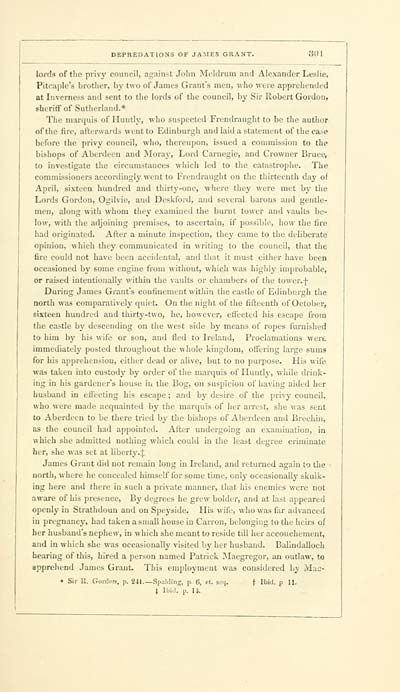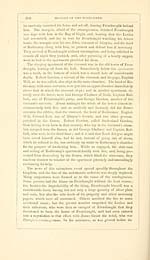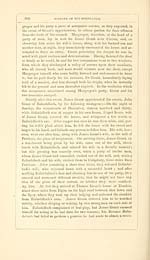Download files
Complete book:
Individual page:
Thumbnail gallery: Grid view | List view

DEPREDATIONS OF JAMES GRANT. 3111
lords of the pvivy council, against John Mcldrum and Alexander Leslie,
Pitoaple's brother, by t«o of James Grant's men, ^^■ho were apprelioiidcd
at Inverness and sent to the lords of the council, by Sir Robert Gordon,
sheriff of Sutherland.*
The marquis of Huntly, who suspected Frendraiight to be the author
of the fire, afterwards went to Edinburgh and laid a statement of theca--6
before the privy council, who, thcreujion, issued a eonunission to the
bishops of Aberdeen and INIoraj-, Lord Carnegie, and Crowner Bruce,
to investigate the circumstances which led to the catastrophe. The
commissioners accordingly went to Frendraught on the thirteenth day of
April, sixteen hundred and thirty-one, where they were met by the
Lords Gordon, Ogilvie, and Deskford, and several barons and gentle-
men, along with whom they examined the burnt tower and vaults be-
low, with the adjoining premises, to ascertain, if possible, how the fire
had originated. After a minute inspection, they came to the deliberate
opinion, which they communicated in writing to the council, that the
fire could not have been accidental, and tliat it must either have been
occasioned by some engine from without, which was highly improbable,
or raised intentionally within the vaults or chambers of the tower. -j-
During James Grant's confinement within the castle of Edinburgh the
north was comparatively quiet. On the night of the fifteenth of October,
sixteen hundred and thirty-two, he, however, effected his escape from
the castle by descending on the west side by means of ropes furnished
to him by his wife or son, and fled to Ireland, Proclamations were
immediately posted throughout the vhole kingdom, offering large sums
for his apprehension, either dead or alive, but to no purpose. His wife
was taken into custody by order of the marquis of Huntly, while drink-
ing in his gardener's house in the Bog, on suspicion of having aided her
husband in effecting his escape ; and by desire of the pi'ivy council,
who were made acquainted by the marquis of her arrest, she was sent
to Aberdeen to be there tried by the bishops of Aberdeen and Brechin,
as the council had appointed. After undergoing an examination, in
which she admitted nothing which could in the least degree criminate
her, she was set at liberty.J
James Grant did not remain long in Ireland, and returned again to the
north, where he concealed himself for some time, oidy occasionally skulk-
ing here and there in such a private manner, that his enemies were not
aware of his presence. By degrees he grew bolder, and at last appeared
openly in Strathdoun and on Speyside. His wife, who was far advanced
in pregnancy, had taken a small house in Carron, belonging to the heirs of
her husband's nephew, in which she meant to reside till her accouchement,
and in which she was occasionally visited Ijy her husband. Balindalloch
bearing of this, hired a person named Patrick Macgregor, an outlaw, to
apprehend James Grant. This employment was considered by Mac-
• Sir U. Gordon, p. 241.— Spulding, p^ 6, el. soq. f IWd. p 11.
j Iliiil. p. 11.
lords of the pvivy council, against John Mcldrum and Alexander Leslie,
Pitoaple's brother, by t«o of James Grant's men, ^^■ho were apprelioiidcd
at Inverness and sent to the lords of the council, by Sir Robert Gordon,
sheriff of Sutherland.*
The marquis of Huntly, who suspected Frendraiight to be the author
of the fire, afterwards went to Edinburgh and laid a statement of theca--6
before the privy council, who, thcreujion, issued a eonunission to the
bishops of Aberdeen and INIoraj-, Lord Carnegie, and Crowner Bruce,
to investigate the circumstances which led to the catastrophe. The
commissioners accordingly went to Frendraught on the thirteenth day of
April, sixteen hundred and thirty-one, where they were met by the
Lords Gordon, Ogilvie, and Deskford, and several barons and gentle-
men, along with whom they examined the burnt tower and vaults be-
low, with the adjoining premises, to ascertain, if possible, how the fire
had originated. After a minute inspection, they came to the deliberate
opinion, which they communicated in writing to the council, that the
fire could not have been accidental, and tliat it must either have been
occasioned by some engine from without, which was highly improbable,
or raised intentionally within the vaults or chambers of the tower. -j-
During James Grant's confinement within the castle of Edinburgh the
north was comparatively quiet. On the night of the fifteenth of October,
sixteen hundred and thirty-two, he, however, effected his escape from
the castle by descending on the west side by means of ropes furnished
to him by his wife or son, and fled to Ireland, Proclamations were
immediately posted throughout the vhole kingdom, offering large sums
for his apprehension, either dead or alive, but to no purpose. His wife
was taken into custody by order of the marquis of Huntly, while drink-
ing in his gardener's house in the Bog, on suspicion of having aided her
husband in effecting his escape ; and by desire of the pi'ivy council,
who were made acquainted by the marquis of her arrest, she was sent
to Aberdeen to be there tried by the bishops of Aberdeen and Brechin,
as the council had appointed. After undergoing an examination, in
which she admitted nothing which could in the least degree criminate
her, she was set at liberty.J
James Grant did not remain long in Ireland, and returned again to the
north, where he concealed himself for some time, oidy occasionally skulk-
ing here and there in such a private manner, that his enemies were not
aware of his presence. By degrees he grew bolder, and at last appeared
openly in Strathdoun and on Speyside. His wife, who was far advanced
in pregnancy, had taken a small house in Carron, belonging to the heirs of
her husband's nephew, in which she meant to reside till her accouchement,
and in which she was occasionally visited Ijy her husband. Balindalloch
bearing of this, hired a person named Patrick Macgregor, an outlaw, to
apprehend James Grant. This employment was considered by Mac-
• Sir U. Gordon, p. 241.— Spulding, p^ 6, el. soq. f IWd. p 11.
j Iliiil. p. 11.
Set display mode to: Large image | Transcription
Images and transcriptions on this page, including medium image downloads, may be used under the Creative Commons Attribution 4.0 International Licence unless otherwise stated. ![]()
| Early Gaelic Book Collections > Ossian Collection > History of the Highlands and of the Highland clans > Volume 1 > (415) |
|---|
| Permanent URL | https://digital.nls.uk/79677577 |
|---|
| Description | Vol. I. |
|---|---|
| Shelfmark | Oss.247 |
| Additional NLS resources: | |
| Attribution and copyright: |
|
| Description | Selected books from the Ossian Collection of 327 volumes, originally assembled by J. Norman Methven of Perth. Different editions and translations of James MacPherson's epic poem 'Ossian', some with a map of the 'Kingdom of Connor'. Also secondary material relating to Ossianic poetry and the Ossian controversy. |
|---|
| Description | Selected items from five 'Special and Named Printed Collections'. Includes books in Gaelic and other Celtic languages, works about the Gaels, their languages, literature, culture and history. |
|---|

